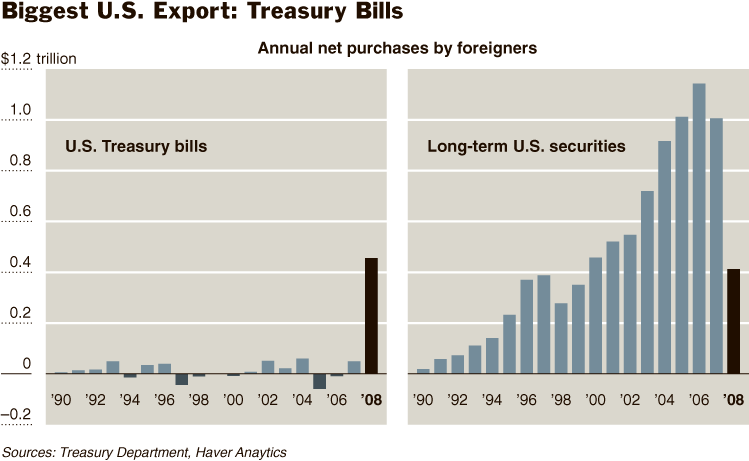JUST when the United States really, really needs the money, overseas investors seem to be less willing to buy long-term American securities.

If you enjoy the content at iBankCoin, please follow us on TwitterThe government said this week that net purchases of those securities fell to $412.5 billion in 2008, less than half the 2007 level and the lowest annual total since 1999, when the federal government was running a budget surplus.
Money did come in, but it was diverted into the safest investment around, albeit one with almost no expectation of profit, Treasury bills. Overseas investors increased their holdings of those securities by $456 billion, an unprecedented flow.
A good part of that cash may have come from investors who would otherwise have invested in bonds issued by Fannie Mae and Freddie Mac, the government-sponsored mortgage lending enterprises.
For many years, those securities, which carried an implicit — that is, not certain — government guarantee, were popular overseas because they yielded more than Treasury bonds but seemed to have little additional risk.
But foreigners began selling them as the financial crisis accelerated last summer, and continued doing so even after the government rescued Fannie and Freddie and issued an explicit guarantee of their debts. Over all, foreigners sold $37.8 billion of agency securities. It was the first year since 1983, when the agency market was much smaller, that foreigners were net sellers.
The aversion to risk also showed up in the choice of long-term securities that were purchased. Foreigners bought a net $316 billion in Treasury notes and bonds, the most in three years. But purchases of corporate bonds and stocks plunged.
It has long been a cliché that foreign investors in any market lack local knowledge and get the timing wrong. The data bears that out this year. The largest annual flow into American stocks ever was in 2007, when $195.5 billion came in. That broke the previous record of $174.9 billion, set in 2000. Stock prices fell sharply after each of those years.
The decline in funds for corporate bonds was not entirely attributable to a new hesitation to lend money to companies. The government counted other securities — like private mortgage-backed securities — as corporate bonds, and those markets have basically dried up. In any case, foreign purchases of corporate bonds fell to under $100 billion in 2008, less than a fifth of the level two years before.
Official institutions — foreign governments and central banks — have largely stopped investing in long-term American securities, a fact that may reflect their need for funds at home as the global recession deepens. Those institutions were net sellers in every month from July through December, an unprecedented stretch.
The fact that so much of the money came into Treasury bills — which mature within a year — means that the owners can get their money back whenever they wish, and will get it soon if they simply do nothing. It is thus readily available to move rapidly.
When the fear that drove money into Treasury bills fades, it may become clearer whether the rest of the world still sees the United States as a good place for long-term investments.


